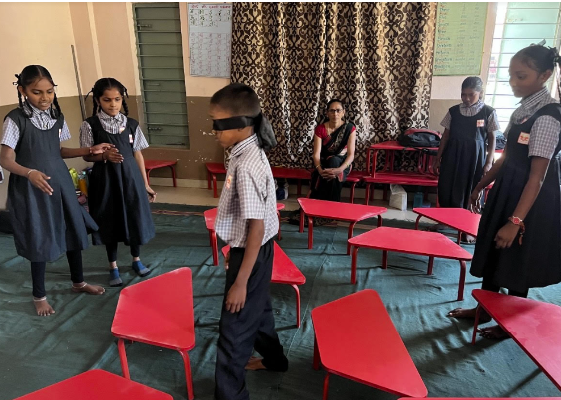Our CAS project, “Celebration of Learning,” aimed to bridge the educational gap for underprivileged children. As a student at an IB school, I have acquired various life skills that have significantly contributed to my personal development. Recognizing the value of these skills in personal growth, we aspired to impart them to students in underprivileged schools in the villages. We visited four different schools where we engaged in skill-based activities. Some of the skills that we practiced with them were problem-solving, communication, critical thinking, decision-making, and collaboration. The activities were planned for grades 3 to 8, and would be helpful in the future, irrespective of their career path. We carefully planned activities that were not only enjoyable but also highly beneficial.
The learning outcomes achieved during the experience :
LO 1: Identify own strengths and develop areas for growth.
Through this experience, I was able to identify my strengths and areas for growth. I recognized that I am good at working with children. I also demonstrated effective time management skills by consistently ensuring that our activities were completed as scheduled. However, I also recognized a potential area for improvement: patience. There were instances when I found myself becoming easily frustrated when the children didn’t follow instructions or didn’t make the most of the resources provided for the planned activities. Patience is the area I could improve upon.
LO 2: Demonstrate that challenges have been undertaken, developing new skills in the process.
In the beginning, the children were shy and hesitant to open up, which made it difficult to carry out the activities planned for them. However, over time, they gradually became more actively engaged and began to enjoy the tasks. Additionally, because of the language difference, there were moments when I struggled to understand what the children were trying to communicate. Fortunately, we had a staff member from their school who stayed with us to assist. This helped us communicate more effectively and was quite useful. Overall, my communication skills were developed during this experience.
LO 3: Demonstrate how to initiate and plan a CAS experience.
It was important that we create a detailed list of activities, outline the procedures involved, and had a rough idea of what we wanted before reaching out to the schools in the village. Planning activities involved brainstorming ideas and research skills, and listing the resources that would be needed, such as junga blocks, cards, and ribbon for blindfold. Once the planning was completed, we moved on to get the project approved and then got in touch with the NGO schools to execute our project.
LO 4: Show commitment to and perseverance in CAS experiences.
I have shown my commitment and perseverance in several ways during this project. Firstly, I dedicated a significant portion of my time to planning and executing these school visits, ensuring that they were not merely one-off events but sustained efforts. There were moments when few schools denied us, but despite this, we didn’t lose hope and kept contacting other schools until we found ones that would agree to our project. This experience not only enriched the lives of the students but also taught me the invaluable lesson that commitment and perseverance are key factors of meaningful change and personal growth.
LO 5: Demonstrate the skills and recognise the benefits of working collaboratively with others.
As this project was supposed to take place during school hours, we had time constrainsts to complete. We would’nt have completed if not work collaborately. We divided ourself and alloacated activites accordingly. By delegating responsibilites, we were able to streamline the process, ensuring everything was handled ina timely and efficient manner. Additionally, working as a group allowed us to share ideas and plan activies. This experience underscored the importance of working collaboratively towards common goals.
LO 6: Demonstrate engagement with issues of global significance.
The global issue that was applicable was quality education. By imparting our IB skills and knowledge to children in underprivileged schools, we have contributed to their development of essential skills necessary for both academic success and life in general. Moreover, I hope to see them harness these skills to create a positive and meaningful impact on our world.
LO 7: Recognise and consider the ethics of choices and actions.
It was my responsibility to ensure that every child felt comfortable and received equal treatment while actively participating in the planned activities. Additionally, I made sure to address their questions with respect and empathy. It was essential for me to ensure that my actions and words did not cause any harm or make them feel less important than any of us.
Witnessing the smiles on the faces of the children we worked with was truly priceless and made this experience immensely rewarding. It wasn’t just a project; it was an opportunity to learn priceless lessons and experience memorable joy and growth.

